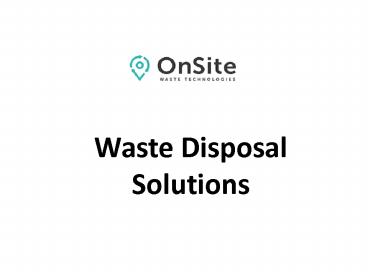Waste Disposal Solution - PowerPoint PPT Presentation
Title:
Waste Disposal Solution
Description:
When it comes to waste disposal solution, you can trust Onsite Waste Technologies to provide you with premium quality waste management products that can convert regulated medical waste into trash in no time. – PowerPoint PPT presentation
Number of Views:132
Title: Waste Disposal Solution
1
- Waste Disposal Solutions
2
- Onsite Waste Technologies
OnSite Waste Technology is a firm located in
Newport Beach, California. We are committed to
lowering the risk, cost, and effects that medical
waste treatment and disposal leave on the
environment. Our current technology TE-5000 is a
processing unit of the size of a desktop but
transforms the waste, including syringes into
disinfected garbage. It lessens the CO2 influence
by lessening waste. Our mission is to reduce the
transportation of waste to any common location.
We are dedicated to presenting greener and
cleaner options for processing the disposal of
medical wastes. We also look forward to assisting
NGOs, first responders, and government agencies
to dispose of large quantities of sharps waste to
minimize the risk for community members, workers,
and others.
3
- Types of Biomedical Waste Disposal Solutions
The regulations for medical waste disposal were
quite lax before the 1980s. However, when the
AIDS epidemic started to spread, it spurred the
need for strict regulations concerning the
disposal of used medical supplies. Waste disposal
is very important, especially so for medical
supplies because they are hazardous materials and
can be contaminated with diseases or dangerous
pathogens. Though strict rules and regulations
for medical waste disposal have been set, it is
important to take additional steps to ensure that
they do not have any impact on the environment.
Not every biomedical waste is disposed in the
same way, and currently, various waste disposal
solutions have been introduced along with the
traditional practices, which can help to get rid
of the medical waste safely.
4
Biomedical Waste Disposal Solutions There are
several ways to dispose of biomedical waste.
However, owing to the highly sensitive component,
it is important to do it in such a way that it
neither affects the environment nor harms human
beings. Every state follows specific techniques
of waste disposal. Some of them are described
here Incineration Biomedical wastes can be
taken care of by incinerating them. The major
benefits of this process are that it is very
easy, simple, and quick. It is not only effective
in removing the waste completely but also highly
efficient in safely removing any microorganisms
that are present on such materials. However,
emissions from burning such hazardous materials
can be particularly dangerous. Though some states
prefer the incineration technique, however, the
materials must be reviewed and determined to be
safe for burning.
5
Chemical Treatment In the case of liquid waste,
the most common method of biomedical waste
disposal is chemical disinfection. Chlorine is
the most preferred choice to execute this
process. It is introduced to the liquid waste so
that the microorganisms and pathogens could be
destroyed and killed. Chemical disposal can be
applied to solid wastes as well, though they
should be ground first to ensure maximum
decontamination. The liquid waste when
decontaminated is usually disposed of into the
sewer system. Conclusion All of the above
mention techniques have certain pros and cons.
However, depending on state compliances and other
feasibility factors, the best waste disposal
solution can vary from state to state. Though
incineration is the most common practice, it
might not be the most advantageous one.
Autoclaving is perhaps a safer option as compared
to incineration, as steam is not harmful. The
thermal elimination process, on the other hand,
has no hazardous emissions, and neither are they
too expensive. Furthermore, the fact this process
works for most of the biomedical waste is also
advantageous. Chemical treatment is mostly used
for liquid wastes.
6
Contact us
Address 4343 Von Karman Ave., Suite 250 Newport
Beach, CA 92660 Mobile No. (949)
409-1346 Website https//www.onsitewaste.com/
7
Social Links
https//www.facebook.com/onsitewaste https//twit
ter.com/WasteOnsite https//www.linkedin.com/comp
any/onsite-waste-technologies/ https//www.instag
ram.com/onsite_waste/































